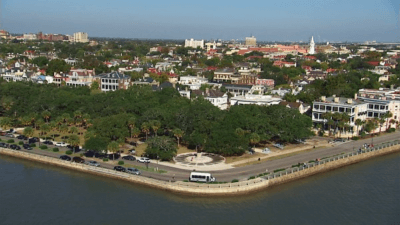 |
|
Everything you ever wanted to know about shooting video in Charleston. Dave Baker – Director of Photography – Charleston, South Carolina – Go To Team |
Charleston is one of the oldest and most historic cities in the nation. Tourism is the city’s largest industry, and it’s not hard to understand why with its abundance of national historic landmarks, art, architecture, restaurants, and beautiful weather. Charleston’s most popular spots include The Battery/White Point Garden which is right next to historic downtown and runs along the Charleston Harbor. Patriots Point is a local and historical landmark that includes tours of the ship and grounds along with venue booking and promotional events. And Fort Sumter is one of Charleston and America’s most historic landmarks since this is where the American Civil War began. Take a tour boat to this secluded island to tour all the bunkers and cannons that were once active over 100 years ago. Travel & Leisure Magazine voted Charleston the Top City in the world for 2016. Travel & Leisure also ranked three of Charleston’s hotels in their “Top 100 Hotels in the Continental US,” including the Sanctuary at Kiawah Island Golf Resort, Wentworth Mansion, and Charleston Place in historic downtown Charleston. The Spectator Hotel was also ranked second best hotel in the world. As stated numerous times by locals and tourists, “There is no place like it.” Each spring Charleston plays host to Spoleto Festival USA, with over 120 performances from disciplines such as opera, dance, theater, jazz, symphonic, and the visual arts. Other main events include Charleston Fashion Week (the second largest fashion week in the US), the Volvo Car Open in Daniel Island, and SEWE (Southeastern Wildlife Exposition). Charleston continues its arts heritage throughout the year, however, with several performances by the Charleston Symphony Orchestra at Gaillard Auditorium and a concentration of art galleries, over 30 of which are located in the French Quarter alone. Visitors can get a dose of southern culture with a tour at one of many of the plantations and gardens located in the Charleston area. Magnolia Plantation & Gardens, Drayton Hall, Middleton Place, Cypress Gardens, and Boone Hall Plantation are just a few of the choices if you are interested in taking a tour of Charleston’s unique historic landmarks. For large conventions and meetings, there is the Charleston Area Convention Center. The facility offers over 150,000 square feet of meeting space and is the largest of its kind in the Southeast. The North Charleston Coliseum adjoins the complex and is host to a number of large concerts and shows, as well as home to the South Carolina Stingrays ice hockey team. Along with hockey, you can attend the minor league baseball team, the Charleston Riverdogs, for weekly and weekend games. There are numerous games available starting in April running through early September. The Charleston Battery is their local soccer team and their season runs during the spring and summer as well. There are numerous resorts in the Charleston area such as Wild Dunes on the Isle of Palms and Kiawah Island Golf Resort. Both facilities provide private communities with access to beaches, golf, tennis, and spas. The Ocean Course at Kiawah Island Golf Resort has played host to several PGA level events, including the 68th Senior PGA Championship. Charleston provides many opportunities for higher education at College of Charleston, The Citadel, Trident Technical College, Charleston Southern University, and The Art Institute of Charleston. Once you’ve decided to shoot in Charleston there’s plenty you should know: Where to Stay There are two major areas to consider when selecting a hotel in Charleston – downtown or the airport. The Charleston International Airport is located in North Charleston and staying in one of the many airport hotels such as Embassy Suites or the Holiday Inn will provide you a central location to all points in the Charleston Metro area. Travel times from these hotels to most places in the surrounding area will be only 15-20 minutes at most, but be prepared to drive if you plan on dining out, visiting downtown, or seeing any attractions the area has to offer. Downtown area hotels such as the DoubleTree by Hilton or the Francis Marion Hotel will put you in the middle of the action and within walking distance of numerous restaurants, theaters, museums, historic landmarks and other tourist attractions. Staying downtown comes with a price, however, as hotels are generally more expensive than you might find by the airport, parking is very limited, and your travel times to some areas will be increased, especially during rush hour traffic. The Wyndham Garden and Charleston Marriott are great options as well with a lower price tag but a farther distance from downtown. There are hotels located in various locations around the city as well as Mt. Pleasant, Isle of Palms, James Island, Folly Beach, Summerville, and Goose Creek. Locations and Drive Times There are several distinct townships in Charleston, including downtown, North Charleston, Mt. Pleasant, West Ashley, James Island, Goose Creek, Summerville, Ladson, Isle of Palms, Sullivan’s Island, Kiawah Island, and Folly Beach. As mentioned in the lodging section of this guide, the airport is centrally located in North Charleston, central to the Greater Charleston Metro Area and is near the intersection of I-26 (East/West route) and I-526 (Charleston’s Beltline.) Drive times from the airport to anywhere in town are generally no more than 20 minutes unless you are visiting the Isle of Palms, Sullivan’s Island, or Folly Beach, in which case you can add another 10-15 minutes driving time to your trip. With the newer developments along Charleston and its neighboring cities, the traffic times have increased so rush hour traffic will be expected during the weekdays. Kiawah Island is remote and isolated, so expect a drive time of almost an hour if you are traveling there from any point in Charleston. Printing directions from Mapquest or using a GPS is highly recommended due to the numerous waterways, bridges, and subsequent twisting roads that can make a seemingly short and simple trip a bit more complicated than necessary. Click HERE for a map of the Charleston Metro Area. Transportation If you are from New York or Los Angeles and have not traveled to the South, you may not know that we don’t have reliable mass transportation. You will have to rely on a taxi, rent a car, or perhaps ask the crew for transportation. Luckily today there are plenty of public transportation options such as Uber and Lyft that can offer you a quick and cheap service. Few camera crews would have difficulty providing transportation, just be sure to communicate your needs with your crew as you set up the shoot. Once you arrive at your location, allow time to park. It seems simple, but parking in downtown can be very difficult. Crews will always appreciate pre-arranged parking, as it simplifies the load-in and avoids the risk of parking violations, although areas outside of downtown are rarely a problem. Weather Charleston’s weather can vary greatly depending on the time of year, but generally, the temperatures in the spring and fall are very comfortable. Although the winter is often very short, the highs can occasionally dip into the 30’s in December, January, and February. Summer is usually very hot and humid. Temperatures can soar well over 100 degrees during the day and heat advisories are often issued during the peak of the summer season. If possible it is often best to schedule interviews and other indoor shooting during the middle of the day and leave the outdoor shoots for earlier in the morning and mid to late afternoon during this time of the year. Be prepared to drink plenty of water to avoid dehydration and be sure to dress in light, cool clothing. With an annual rainfall average of 52”, afternoon thunderstorms during the summer are very common in Charleston, and If you were to look at the weather forecast for any given week in June, July, or August, you would be likely to see rain in the forecast for almost every day. These showers, however, are usually short and scattered and rarely interrupt a shooting schedule to any great degree. In the end, it’s best to check the weather reports just before your visit in order to be prepared for any anomalies in the seasonal weather. Click HERE to see the current 10-day forecast for Charleston, SC. Production Guidelines Crews across the country have a set of guidelines by which they conduct business. And as different as each city is from another, so are those guidelines. Every producer should have a basic understanding of each city’s standards. Shoots in Charleston are based on a ten hour day and the crew is on the clock at the specified crew call. Overtime at a rate of time and a half begins after ten hours. If your shoot takes the crew to a distant location, travel time can be expected. A distant location is any location outside a circle with a 30-mile radius drawn around the city where I-26 and I-526 are the center. But all of these are just guidelines; certainly, verify with your crew their specific policies. Chamber of Commerce / Visitors Bureau If you have additional questions about Charleston you can always contact the city’s Chamber or the Convention and Visitors Bureau. Charleston Chamber of Commerce 2750 Speissegger Drive, Suite 100 North Charleston, SC 29405 843.577.2510 Charleston Convention and Visitors Bureau 423 King St. Charleston, SC 29403 843.853.8000 Booking the Right Crew But even with the perfect location, the best-laid plans, and great weather, so much depends on the right crew. Booking the right crew means finding a crew that not only gets the job done, but does whatever it takes to ensure you have the best shoot. Are you conducting a series of interviews that require dramatic lighting? Are you going to be “run and gun” around the city? Is your shoot going to require any specific equipment? Finding a crew that can handle every one of your needs is just as important as lining up all of the interviews and creating your shot list. For more information on booking your camera crew, see: “Everything you ever wanted to know about booking a video crew.” Copying this information to other sites is allowed only in its entirety, with credit and web link to Go To Team. |
